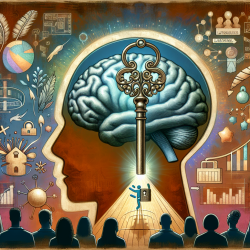Understanding the Role of Non-Cognitive Factors in Academic and Clinical Success
In the realm of graduate rehabilitation science programs, the traditional reliance on cognitive factors such as GPA and standardized test scores is being reevaluated. A recent systematic review, "The relationship of non-cognitive factors to academic and clinical performance in graduate rehabilitation science students in the United States," sheds light on how non-cognitive factors can influence student success. This blog explores how practitioners can leverage these findings to enhance their skills and improve outcomes for students.
Key Non-Cognitive Factors: Grit, Self-Efficacy, and Emotional Intelligence
The review highlights several non-cognitive factors, with grit, self-efficacy, and emotional intelligence being the most studied. Grit, defined as perseverance and passion for long-term goals, showed a positive correlation with academic performance. Students with higher grit tend to have better GPAs, indicating that fostering this trait could lead to academic success.
Self-efficacy, or the belief in one's ability to succeed, was linked to better clinical performance, particularly in physical therapy (PT) and speech-language pathology (SLP) students. Practitioners can encourage self-efficacy by providing supportive feedback and creating opportunities for students to succeed in clinical settings.
Emotional intelligence, while not consistently linked to academic success, showed mixed results in clinical performance. This suggests that while emotional intelligence is important, its impact may vary depending on the context and how it is measured.
Practical Applications for Practitioners
Practitioners can enhance their skills by integrating the following strategies based on the review's findings:
- Foster Grit: Encourage students to set long-term goals and persist through challenges. This can be achieved through mentorship programs and resilience-building workshops.
- Enhance Self-Efficacy: Provide constructive feedback and celebrate small victories to build students' confidence in their abilities.
- Develop Emotional Intelligence: Incorporate training sessions focused on empathy, communication, and emotional regulation to prepare students for clinical interactions.
Encouraging Further Research
While the review provides valuable insights, it also highlights the need for further research to clarify the role of non-cognitive factors in academic and clinical settings. Practitioners are encouraged to participate in or support research initiatives that explore these factors across diverse student populations and educational contexts.
Conclusion
Understanding and leveraging non-cognitive factors can significantly enhance the educational experience and outcomes for rehabilitation science students. By focusing on grit, self-efficacy, and emotional intelligence, practitioners can better prepare students for both academic and clinical success.
To read the original research paper, please follow this link: The relationship of non-cognitive factors to academic and clinical performance in graduate rehabilitation science students in the United States: a systematic review.










